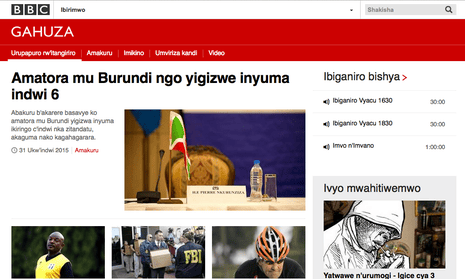Rwanda has placed an indefinite suspension on BBC broadcasts in the county’s most common language in the wake of the row over a documentary on its 1994 genocide.
The government-appointed Rwanda Utilities Regulatory Authority said the BBC’s FM broadcasts in Kinyarwanda would be stopped and its report on the row would be referred to the prosecutor general.
Its move follows an inquiry by Rura that urged the country’s government to take criminal action against the BBC over the film, Rwanda’s Untold Story, broadcast on BBC2 on 1 October 2014.
The report said the documentary had made “a litany of claims and assertions” that “violate Rwandan law, the BBC’s own ethical guidelines and limitations to press freedom”. It also accused the film of “minimising and denying genocide”, urging the government to “initiate criminal and civil processes”.
Rura director Patrick Nyirishema said on Friday that the “airing of the documentary by the BBC constituted abuse of press freedom and free speech”.
He added: “The regulatory board unanimously decided that Kinyarwanda programmes of BBC in Rwanda will be indefinitely suspended. The BBC will continue to air other programmes subject to compliance with Rwandan laws, regulations and licensing requirements. The identified offences are to be transmitted to the prosecutor general for consideration and appropriate action.”
A BBC World Service spokesperson said: “We are extremely disappointed by the decision of the commission to indefinitely suspend the BBC Kinyarwanda programme. The BBC World Service reaches an audience of over 2 million in Rwanda who rely on the BBC for impartial news and information. We stand by our right to produce our independent journalism and strongly reject any suggestion that the documentary Rwanda’s Untold Story constitutes genocide denial.”
In late October last year, the Rwandan government suspended FM services by BBC Gahuza, which broadcasts to the country and neighbour Burundi in their most common language, Kinyarwanda. However, the BBC service – staffed by journalists based in London and the two African countries – is still available to a limited number of Rwandans via the internet.
The UK’s Foreign Office said in March that it recognised “the hurt caused in Rwanda by some parts of the documentary”, but was “concerned” by the move to suspend the BBC’s FM broadcasts and hold an official investigation.
Rwanda’s Untold Story sparked controversy by suggesting President Paul Kagame may have had a hand in shooting down his predecessor’s plane, a crash that triggered the mass killings.
It also quoted US researchers who suggested that many of the more than 800,000 Rwandans who died in the 1994 genocide may have been ethnic Hutus, and not ethnic Tutsis as the government maintains.
Kagame accused the corporation of “genocide denial” in the documentary, which he said it had chosen to “tarnish Rwandans, dehumanise them”.
